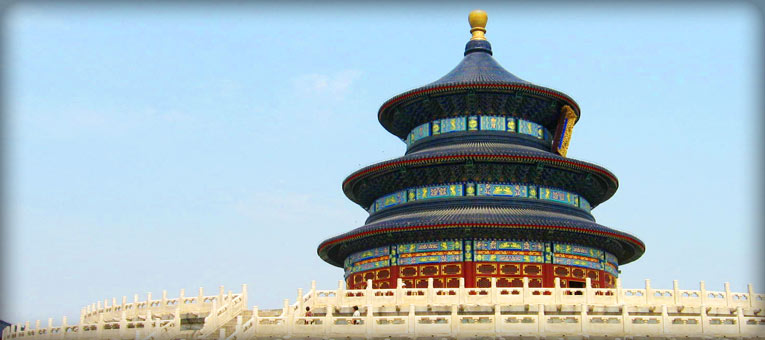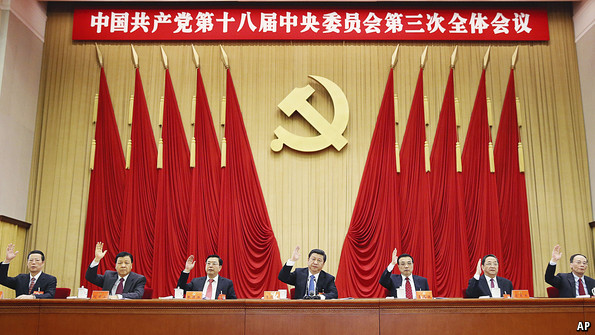US response on China’s claim of Air Defense Zone

US response on China’s claim of Air Defense Zone
Have you guys followed news from China recently? What attracted the most attention is the the CCP 3rd Plenum, which would determine the course of China’s economic and political reforms in the future 10 years.
Here’s a article from the Economist

COMMUNIST Party plenums are rituals of unchanging arcana. The closed-door, four-day conclave of some 370 senior party leaders that ended in Beijing on November 12th was a typical example, as usual summing up its decisions in a gnomic communiqué full of ambiguities. Yet a parsing of the document suggests President Xi Jinping (pictured above, centre) is tightening his grip on power, and with it his ability to achieve breakthroughs in economic and social reforms.
China’s state-controlled media have hailed the meeting, known as the third plenum of the 18th Central Committee, as “a new historical starting point”. Global Times, an English-language newspaper, said it was just as important as the most famous plenum in the party’s history, which brought Deng Xiaoping to power in 1978 and ushered in profound changes that turned China into the world’s second-largest economy. There is little in the communiqué to back such bullish assertions, but the summary of the proceedings offers hope that the pace of reform will pick up.
For the first time in such a document, the party has called for markets to play a “decisive” role in the allocation of resources. This has been glossed by official media as a step up from previous party language that described the role of market forces as merely “basic”. This new language, according to an academic quoted by Global Times, aroused much debate during preparations for the plenum. Semantics can be very important. The party’s decision in 1992 to create a “socialist market economy”, not just a socialist one, caused an upsurge of reformist zeal, including the privatisation or closure of tens of thousands of state-owned enterprises, as well as market-opening measures that paved the way for accession to the World Trade Organisation a decade later.
As expected, this week’s communiqué contained few indications of specific new policies. These will become clearer in a few days or weeks when the resolution is published, and after senior economic officials meet in December to decide on the country’s economic strategy for the year ahead. There was no mention of financial reforms to allow market forces to determine interest and exchange rates, which many economists view as crucial. On rural land reform, also closely watched, the document merely repeated language introduced at a plenum five years ago about the need to unify urban and rural property markets. Despite its reassuring words about the role of the market, it said the state sector should remain the “main body” of the economy, an odd concept, especially since China’s GDP is now largely generated by the private sector.
But at party plenums, repetition of familiar language is not necessarily a sign of inertia. The meeting in 1978 was laden with Mao-era rhetoric, but led to the ditching of Mao’s economic policies. More important were the signals it sent about Deng’s grip on power, including the return to central roles of many of Deng’s allies who had been purged by Mao. The just-concluded plenum announced two institutional changes that suggest Mr Xi has moved fast to consolidate his position.
The first of these is the setting up of a “state-security committee”. Details of this have not been revealed. It may be Mr Xi’s attempt to rein in a security apparatus that had become too powerful in recent years. Some of its functions are expected to mirror those of America’s National Security Council, which advises the president on foreign policy and tries to ensure that all government agencies are well co-ordinated. China’s new body is thought likely to include representatives from the army and police as well as ministries responsible for foreign and economic affairs. It would be a sign of Mr Xi’s growing power if he has at last persuaded the security forces to act more in concert with the rest of the bureaucracy.
The other notable change is the establishment of a “leading small group” to supervise reforms. Such groups count. They report to the Politburo and help to form and implement policy decisions. Again, no details have been given of the new body, but it could help to overcome bureaucratic rivalries that often stymie reforms. It may even be chaired by Mr Xi. The communiqué calls for “decisive results” by 2020 in unspecified “important areas” of reform.
Not surprisingly, given a fierce crackdown on political dissent in recent months, the document said little about political reform (although for the first time in the history of party plenums, Chinese television indulged in a show of glasnost by broadcasting scenes of group discussions, though participants’ voices could not be heard). The communiqué favourably mentions democracy 12 times, but plenum-watchers learned long ago that this particular count is best ignored.
| iReader |
This recent cartoon video that compares the Chinese and the Western leaderships is very popular yet controversial. It has accumulated several millions of clicks on Youku, the most famous Chinese video site. Unsurprisingly, this video attracts a lot of praises, comments and criticisms. Some say it’s very creative and humorous and deepens people’s understanding of different political systems. Other say it’s no more than a propaganda that flatters the CCP. What do you think? You are welcome to leave comments below.
BTW, this video has both English and Chinese versions. Both can be found on Youtube or Youku.